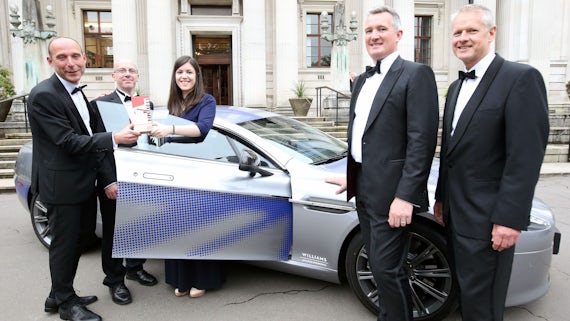International impact
An award-winning project which has transformed catalyst formulation and manufacture of VCM in China.
Gold cleans up

More than 30 years ago it was discovered that gold would be the best catalyst for vinyl chloride monomer (VCM) production in acetylene hydrochlorination. However, there are challenges with developing a commercially feasible catalyst system using gold.
Until recently, mercuric chloride supported on carbon has been used as the catalyst in the commercial process but this exhibits severe problems associated with catalyst lifetime and mercury loss, which in turn leads to significant environmental pollution and threats to human health.
The remarkable ability of gold to speed up reactions was first discovered by Professor Graham Hutchings and his team at the Cardiff Catalysis Institute (CCI). Johnson Matthey, a UK multinational specialty chemicals and sustainable technologies company, partnered with Professor Graham Hutchings and scientists from CCI on a project aimed to design a stable gold catalyst that could operate with very long lifetimes using only a very small amount of gold. It was key that the gold catalyst could be provided as a drop in solution to replace the current highly polluting mercury catalyst.
This is a great collaborative partnership between Cardiff University and Johnson Matthey, both in chemistry and chemical engineering. This novel catalyst, PRICAT™ MFC, is a further example of Johnson Matthey's capabilities in and commitment to sustainable technologies.
Sustainable technology
The project surpassed its objectives in developing a novel highly stable, commercially viable catalyst that uses a very low amount of gold to manufacture vinyl chloride monomer (VCM) – used in the production of PVC. The team's discovery that new gold sulfur complexes can be made in water was crucial and simplified catalyst preparation which can be commercially operated. The active gold, non-polluting catalyst has a far superior performance than that of the mercury catalyst and has now been fully commercialised as a catalyst in China.
It is the first time in over 50 years that a complete overhaul in catalyst formulation has been implemented for the production of any commodity chemical. Johnson Matthey have built a world-class commercial catalyst manufacturing plant at its Shanghai site, China, for the dedicated manufacture and supply of commercial gold on carbon catalyst for the manufacture of VCM in China. Professor Hutchings and the academic team have further enhanced the University's reputation for its world-class facilities and expertise for the study of gold catalysts.
The catalyst won the IChemE Global Award in the Innovative Product of 2015 category and was shortlisted in the Sustainable Technology 2015 category. The project also won the JM Inventor Recognition Award within Johnson Matthey in 2013 and was the recent winner of the International Impact award at the 2016 Cardiff University Innovation and Impact Awards ceremony.

We are delighted to be recognised for our work as international innovators in cleaning up the global environment. After 2017, a binding international treaty to reduce mercury use means that Acetylene based VCM plants around the world will need to use a mercury-free catalyst, providing there is an economically available alternative. Our project has shown that gold provides the best possible solution.
Learn about our award-winning collaborations.
